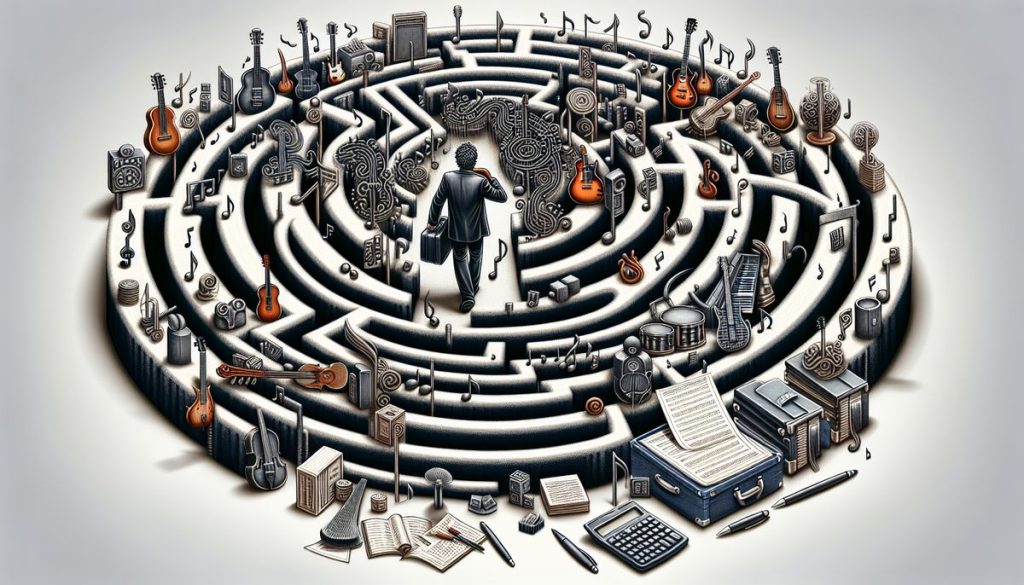Navigating the New Beat: Essential Steps for Starting and Sustaining Your Music Career in Today’s Industry
Written by DJ Prodigee on Tue Mar, 2024
Embarking on a music career today is as much about sharp business acumen as it is about talent. With the digital age offering myriad opportunities for artists, understanding the essentials of forming and operating a music business is crucial. This article lays out five fundamental steps that are instrumental for up-and-coming musical artists to not only establish their business but also to thrive in the competitive landscape of today’s music industry.
Key Takeaways
- Develop a comprehensive business plan to guide your music career with clear objectives and strategies.
- Master branding and marketing to create a strong, recognizable image and connect with your audience.
- Implement sound financial management and tax planning to ensure long-term sustainability and legal compliance.
- Seek legal counsel and engage in careful contract negotiation to protect your interests and intellectual property.
- Cultivate a personal style and brand, and leverage networking and collaboration to expand your reach and opportunities.
Tuning Up Your Business Chords: The Startup Symphony
Composing Your Business Plan Masterpiece
Alright, future music moguls, let’s face the music: your business plan is the ultimate setlist for your band’s world tour. It’s the blueprint that’s going to guide you from garage jams to sold-out stadiums. But before you start dreaming of groupies and Grammy speeches, you’ve got to get the basics down pat.
Remember, even if you’re the next big thing since sliced bread, you still need to understand the business formation, music marketing, financial navigation, copyright, and legal aspects in the music industry to succeed.
Educate yourself, even if you plan to hire others to handle the business stuff. You don’t want to be the artist who knows less about their career than the intern fetching coffee. And hey, if all else fails, slap on some more glitter and turn up the bass!
Branding: Finding Your Unique Sound in the Industry
Alright, you musical maestro, let’s dive into the wild world of branding and marketing. It’s like trying to stand out at a festival where everyone’s wearing glitter and neon
First things first, identify your target audience. Are you serenading the soulful seniors or dropping beats for the TikTok teens? Knowing your crowd is key to making them swoon. Next up, branding. It’s not just about slapping a cool logo on a T-shirt; it’s about creating an identity that resonates with your fans and sticks in their minds like that catchy chorus you can’t stop humming.
Keep in mind that not everyone will enjoy your music, but that’s okay. Your goal isn’t to please everyone; it’s to find those who’ll jam to your tunes as if it’s the last song on earth.
Remember, creating your brand is like crafting a hit song
- Define Your Unique Style and Image
- Create a Strong Online Presence
- Network and Collaborate with Other Musicians
- Consistently Create and Share New Content
Marketing Mixtape: Crafting Hits That Stick
Let’s face it, your music is your baby, and like any proud parent, you want to show it off to the world. But before you set the stage on fire, you’ve got to light the spark with some killer marketing moves. Master music marketing by defining your sound, crafting your image, being social media savvy, and networking. Understand business formation for legal structures in the music industry to ensure your tunes are not just heard, but remembered.
Keep your fans on the edge of their seats! Tease them with sneak peeks, tantalizing trailers, and enough hype to make them mark their calendars. You’re not just dropping tunes; you’re launching an experience.
Now, onto the nitty-gritty. Here’s a list of things you should be scribbling down in your marketing playbook:
- Develop a clear and catchy message that resonates with your audience.
- Targeted ads are a great way to market your music career as an independent musician.
- Always maintain your mental health; a happy artist is a productive artist.
Remember, creating your brand is like crafting a hit song—it takes time, creativity, and a dash of madness. And just like you wouldn’t release a track without a killer drop, don’t launch your brand without a strategy that makes people go ‘Wow!’.
Money Notes: Financial Finesse for the Funky Freelancer
Royalty Rundown: Cashing in on Your Creativity
Let’s face it, the only thing better than a standing ovation is a fat royalty check. Understanding the flow of royalties is like finding the secret map to the treasure chest of your music career. But beware, matey, it’s not just about making music; it’s about making money.
Now, let’s talk money \- because even rockstars need to pay the bills. Make a budget for your promotional escapades and other expenses. And hey, unless you’re a math whiz who gets a kick out of crunching numbers, employ an accountant to keep your finances in tune and your taxes filed on time.
Here’s a quick breakdown of the types of royalties you might encounter:
- Performance Royalties: When your jam plays on the radio, at a club, or even in an elevator.
- Mechanical Royalties: Every time your song is reproduced, like CDs, vinyl, or digital downloads.
- Synchronization Royalties: When your track gets hitched to a movie, TV show, or commercial.
- Print Royalties: Yes, sheet music sales still count.
Remember, collecting royalties is like playing whack-a-mole with opportunities \- stay alert and always be ready to swing your mallet!
Tax Tunes: Keeping Your Finances in Harmony
Let’s face it, the only thing less exciting than talking about taxes is actually doing them. But, just like that one song you can’t get out of your head, taxes are a sticky part of the music biz you can’t ignore. Get yourself an accountant who’s in tune with your financial needs, and you’ll be singing all the way to the bank.
Remember, investing in your career is great, but saving some cash for a rainy day (or a global pandemic) is the real encore performance.
Claiming expenses is like finding an extra pick in your guitar case right when you need it. Here’s a quick hit list of deductible expenses to keep your finances rocking:
- Studio time and equipment
- Travel expenses for gigs
- Marketing and promotional costs
- Music video production
- Instrument maintenance and repairs
And hey, if all else fails, slap on some more glitter and turn up the bass! But seriously, educate yourself on the financial guide for musicians: choose your business structure wisely, manage your finances like a pro, diversify your revenue streams, and understand the legal aspects to ensure your success in the industry.
Investing in Your Setlist: Smart Spending for Musicians
Here’s the deal: you’re a musician, not a stockbroker, but that doesn’t mean you can’t be a maestro of money management. Keep those receipts—yes, even for the pizza party after your gig—because when it comes to finances, every note counts. Here’s a quick rundown of what to track:
- Income from gigs, streams, and fan adoration
- Expenses like travel, equipment, and those snazzy band t-shirts
- Investments, because a rockstar retirement is the ultimate gig
Remember, investing in your career is great, but saving some cash for a rainy day (or a global pandemic) is the real encore performance.
Claiming expenses can feel as good as a guitar solo, so don’t let the taxman be the only one doing a happy dance with your hard-earned cash. And unless you’re the Mozart of money, consider getting an accountant to keep your finances in harmony.
Legal Riffs: Navigating the Maze of Music Law
Copyright Crusade: Protecting Your Musical Mojo
Alright, you riff-raff of the recording world, let’s get down to brass tacks. Navigating copyright and trademark law in the music industry is like trying to play a guitar solo blindfolded—tricky, but with the right moves, you’ll be the one taking a bow. First things first, register those tunes! It’s like putting a padlock on your creative treasure chest.
And remember, kids, always have your licenses in order before you hit that upload button. You don’t want to be that artist who’s all dressed up with nowhere to stream.
Now, let’s break it down with a list that’s easier to follow than a metronome:
- Seek legal counsel and engage in careful contract negotiation to protect your interests and intellectual property.
- Formulate a release strategy and utilize effective distribution channels to maximize your music’s reach and impact.
Remember, a contract is not just a piece of paper; it’s a sacred pact between you and the money gods. So, get yourself some legal services and advice to navigate the treacherous waters of the music biz.
Trademark Tango: Securing Your Signature Style
Let’s face it, in the grand opera of the music biz, your style is the diva that needs the spotlight. Securing your signature style isn’t just about finding the right pair of leather pants; it’s about creating an identity that fans can spot from a mile away, like a neon sign at a dive bar.
So, how do you trademark your tango? Here’s a quickstep guide:
- Identify your audience: Are they headbangers or heartstring-pullers?
- Craft your image: From logos to lyrics, make sure it screams ‘you’.
- Legal legwork: Protect your brand like it’s the last slice of pizza at band practice.
Remember, your brand is your promise to your audience—a sonic handshake that says, ‘Hey, I’m the real deal.’ So, put on your dancing shoes and let’s cha-cha through the legal labyrinth!
Your brand is the encore your fans are always waiting for. Make it memorable, make it undeniably yours, and they’ll keep coming back for more.
Contract Cadence: Negotiating Deals Like a Rockstar
Alright, rockstars and pop divas, let’s get serious for a hot minute. When it comes to the legal mumbo-jumbo, you don’t want to be caught with your pants down. Having a savvy attorney in your band’s entourage is like having a superhero on speed dial. They’re the ones who’ll make sure you’re not signing away your firstborn to a sneaky record label.
Remember, a contract is not just a piece of paper; it’s a sacred pact between you and the money gods. So, get yourself some legal services and advice to navigate the treacherous waters of the music biz.
And hey, if you ever feel like you’re drowning in legalese, just remember: the right attorney will turn those confusing clauses into music to your ears.
Here’s a quick rundown of contracts you might encounter:
- Standard Contracts (like those for gigs and jam sessions)
- Music Teacher Contract Guides & Templates (for when you decide to spread your musical wisdom)
- Session Recording Contracts (so you get paid for every sick beat you lay down)
The Art of Noise: Developing Your Personal Brand
Instrumental Insights: Mastering More Than Air Guitar
Let’s face it, shredding on your air guitar might win you some serious cool points at parties, but when it comes to the real deal, you’ve got to up your game. First, get yourself a reasonably good guitar. It’s like choosing a wand in the wizarding world of music; it’s got to feel just right. And once you’ve got your trusty six-string, it’s time to dive into the deep end of practice. Remember, even the greatest were once beginners, so don’t fret (pun intended) if you hit a sour note or two.
Practice isn’t just about nailing those scales; it’s about teaching yourself how to deal with nerves. Take a deep breath, focus, and let your fingers do the talking. And hey, if you’re feeling adventurous, why not try mastering a few tracks for local bands? It’s a win-win: they get a polished sound, and you get to flex your musical muscles.
Now, don’t just stick to your bedroom studio. Go out, experience live music, listen to recordings, and get to know what different instruments sound like. It’s all about having ‘big ears’ and being able to relate to all kinds of music. And remember, no matter how much you love your headphones, they can give you a weird perspective on music. Find a room where the air moves, and your music can breathe.
Style Sessions: Keeping Up with the Chart-Toppers
Let’s face it, staying fresh in the music biz is like trying to keep a one-hit wonder from vanishing into the abyss of forgotten jingles. You’ve got to evolve faster than a pop star’s wardrobe changes during a single awards show. But how do you keep up without burning out or, worse, selling out?
First, you’ve got to tune into the rhythm of the times. Here’s a quick checklist to keep your style sessions on point:
- Dive into different genres and study the maestros. What’s their secret sauce?
- Network like you’re the social butterfly of the music scene. Remember, it’s not just what you know, it’s who you know.
- Keep your social media game strong. Engage with fans and tease them with snippets of your upcoming beats.
Embrace the grind. If you’re gigging from dusk till dawn and mixing tracks in your sleep, you’re doing it right.
Remember, the key to staying relevant is not just about chasing trends. It’s about creating a sound so catchy, even your grandma wants to put it on her workout playlist. So, keep those style sessions innovative, and maybe you’ll be the one setting the next big trend!
EPK Essentials: Your Digital Backstage Pass
Alright, you musical maverick, it’s time to talk about your EPK—your electronic press kit. Think of it as your digital handshake, the first impression that says, "Hey, I’m a big deal." But let’s be real, crafting an EPK that sings sweeter than a choir of angels isn’t just about slapping together your best selfies and a Spotify link. You’ve got to tell your story in a way that would make even your grandma swipe right.
Here’s the skinny on making your EPK pop:
- Highlight your sound: Include tracks that showcase your range. Think of it as your greatest hits, minus the filler.
- Brag a little: List your gigs, awards, and any time you made someone’s cat purr with your tunes.
- Press snippets: Got a review that didn’t come from your mom? Slap it in there.
- Tech specs: If you’ve got rider requests that don’t include only green M&Ms, this is the spot.
Remember, the best way to create a well-designed EPK is to think about the presentation from the perspective of someone who has not heard your music before. Make sure it’s as polished as your Grammy acceptance speech rehearsal.
Pro tip: Keep your EPK updated like your social media status—because nobody cares about your 2012 ‘Underwater Basket Weaving’ phase.
Networking Nirvana: Building Your Band of Believers
Gigging Your Way to Glory: The Local Scene Lowdown
Alright, you musical mavericks and business-savvy songsters, we’ve jammed through the nitty-gritty of turning your passion into a paycheck. Now, let’s talk local gigs, the bread and butter of your live scene hustle. Remember, every gig is a stepping stone to your next big break, so treat each one like it’s a sold-out stadium show.
Here’s the lowdown on getting down in your town:
- Go hang out at local gigs. You never know who you’ll meet or what opportunities might arise from just showing up.
- Put your cards up in studios, cafes, and anywhere else potential fans and collaborators might lurk.
- Have professionally recorded music ready to share. Your tunes are your resume, so make sure they’re top-notch!
- Get on the phone, internet, etc., and book some gigs. The more you play, the more you’re heard, and the more you’re heard, the more you’ll play—it’s a beautiful cycle.
- Get an internet presence. It’s the digital age, baby! Platforms like Twitter, Facebook, Instagram, TikTok, and YouTube are your friends.
Pro tip: Always be gig-ready. Keep your gear in check, your setlist tight, and your stage banter even tighter. You want to leave a lasting impression that screams encore, not exit stage left.
Collaboration Concerto: Jamming with Industry Insiders
Let’s face it, going solo might make you the next big ‘one-man band’ sensation, but even a lone wolf can benefit from joining the pack now and then. Networking with industry insiders can be your golden ticket to the big leagues. Imagine securing opening act opportunities where you’re the warm-up to the main event, or better yet, learning from music legends who can teach you the secret handshake to success.
Remember, collaboration isn’t just about making sweet music together; it’s a strategic move to amplify your reach and resonate with a broader audience.
Here’s the lowdown on why you should start jamming with those in the know:
- Access to new opportunities and connections within the music industry
- Exchange of ideas and knowledge with fellow music producers and artists
- Enhancement of your music production skills through collaborative experiences
- Expansion of your fanbase and exposure to new audiences
- Exploration of new genres and styles by working with diverse collaborators
So, grab your instrument, check your ego at the door, and get ready to riff with the best of them. After all, it’s not just about who you know, but who knows you and your killer beats!
Producer Partnerships: Finding Your Studio Soulmates
Let’s face it, finding the right producer is like swiping right on the perfect beat-making bae. It’s all about that magical mix of vibes, vision, and vinyl (okay, maybe not so much vinyl these days, but you get the picture). Collaborating with a producer can catapult your sound into the stratosphere, where your tunes are not just heard, but felt across galaxies.
When you sync up with a studio soulmate, you’re not just jamming—you’re creating a symphony of success. It’s the peanut butter to your jelly, the bass to your treble, the kick to your snare.
Here’s a quick hit list to keep in mind when looking for your producer partner in crime:
- Communication is key: Be clear about your sound and goals.
- Mix and match: Find someone whose style complements yours.
- Track record matters: Check out their past work and successes.
- Budgeting beats: Make sure their costs won’t break your bank.
Remember, the right producer can turn your musical doodles into masterpieces. So, take your time, do your homework, and when you find ‘the one’, make some beautiful music together!
Rockin’ It Out: Your Encore in the Music Biz
Alright, you musical mavericks and tune-crafting trailblazers, we’ve jammed through the nitty-gritty of starting your own music empire. Remember, it’s not just about having a voice that can make a werewolf howl in harmony; it’s about being the CEO of ‘Me, Inc.’ So, slap on that guitar, tickle those ivories, and maybe even bust out the ol’ kazoo if that’s your jam. Just make sure you’re not only rocking the stage but also rocking the books, the brand, and those oh-so-fun legal bits. Keep strumming, drumming, and humming your way to the top – and who knows, maybe you’ll be the one turning bread into toast for the next generation of music legends. Mic drop, article out!







